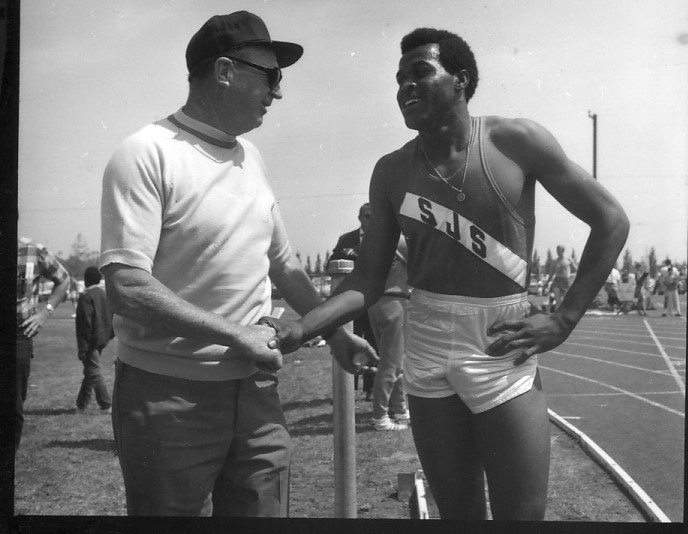Article originally published by SJSU Athletics | Lawrence Fan
Best known as a 1968 two-time Mexico City Olympic Games track and field champion, Lee Evans (1947-2021) died at age 74 in Nigeria.
At 21-years old, the Madera, Calif., native was a pillar of San José State’s world-renowned brand known as “Speed City.” As a slender 158-pound college student by his own admission, he won gold medals in the men’s 400 meters and the men’s 4×400 meter relay at the 1968 Mexico City Olympic Games in world and Olympic Games record-setting times. Mr. Evans is the university’s first and only two-time Olympic Games gold medal winner.
Lee Evans was the first person to run 400 meters under 44.0 seconds with his winning time of 43.86. And, Mr. Evans ran the anchor leg of the victorious USA 4×400 relay team that crossed the finish line with a clocking of 2:56.16. The gold-medal winning 400-meter time remained a world record until 1988 and the 4×400 relay world mark stood until 1992.
The winning performances were in the shadow of controversy. Evans had considered withdrawing from Olympic competition following San José State and USA teammates Tommie Smith and John Carlos were expelled from the Olympic Village. After Smith won the men’s 200-meter dash with Carlos finishing third, both athletes raised a clenched fist in the air during the victory stand ceremony. Approaching the victory stand following his 400-meter victory, Mr. Evans, silver medalist Larry James and bronze medalist Ron Freeman wore black berets as their sign of support for the Olympic Project for Human Rights.
For his gold medal-winning performances, he was named Track & Field News’ U.S. College Athlete of the Year. From 1966 through 1968 and again in 1970, he was ranked #1 in the world in the 400 meters by Track & Field News. Mr. Evans also was ranked in the top-10 in the 400 by Track and Field News in 1969 (second), 1971, (ninth) and 1972 (third).
The 1970 San José State graduate was captain of the Spartans’ 1969 team that won the NCAA Division I Men’s Outdoor Track and Field championship in Knoxville, Tenn. While at San José State, Mr. Evans also was a member of the Spartans’ 1967 world-record-setting 880-yard relay team that included Tommie Smith, Ken Shackelford and Bob Talmadge.
“SOCIAL JUSTICE ADVOCATE”
His track and field notoriety runs parallel to his humanitarian contributions in the United States and, particularly, in the African continent.
According to Dr. Harry Edwards, the founder of the Olympic Project for Human Rights and San José State graduate, “Lee Evans was one of the greatest athletes and social justice advocates in an era that produced a generation of such courageous, committed, and contributing athlete-activists.
“He was an originating founder and advocate of the Olympic Project for Human Rights and what evolved in the late 1960’s into an all-out revolt among Black athletes over issues of injustice and inequality both within and beyond the sports arena. In no small measure, today’s athletes can stand taller, see farther and more clearly, and reach higher in pursuit of achievement and change in both sport and society because they stand on the shoulders of GIANTS such as Lee Evans.”
Mr. Evans shared his knowledge and experiences in track and field with interested parties of all ages domestically and internationally. There were college coaching appointments at San José State, the University of Washington, and the University of South Alabama.
He served as the director of athletics for Special Olympics International from 1988 to 1990. Evans provided technical assistance to Special Olympics programs in the United States, its territories and 90 countries around the world.
The United States Information Service (U.S.I.S.) agency appointed Mr. Evans as a track and field clinician for Sports America as a leader of coaching clinics throughout the world, particularly, in developing countries.
THE HUMANITARIAN – NELSON MANDELA AWARD RECIPIENT
A Fulbright Scholar, Mr. Evans spent much of his post-competitive life on the African continent as a track and field coach and a humanitarian. He was a professor of biomechanics at the Cameroon National Institute of Youth and Sports and an associate professor of physical education at the University of Ife in Nigeria.
Mr. Evans coached the national track and field teams of Qatar, Cameroon and Nigeria.
In 1991, he was a recipient of a Nelson Mandela Award given to those who “…stood for the values of equality and friendship and respect of human rights, against apartheid and any form of racism.” In the 1980’s, Mr. Evans was focused on the Madagascar Project which included providing a fresh water supply, power, and electricity; creating economic self-sufficiency through profitable cash crop farming; improving the transportation system; and access to medical care.
MORE HONORS
A member of the San José State Hall of Fame, he also is enshrined in the United States Olympic Hall of Fame, U.S.A. Track and Field Hall of Fame, the Bay Area Sports Hall of Fame, the city of San Jose Sports Hall of Fame, and the African American Athletes Hall of Fame. Mr. Evans also was a 1994 recipient of a NCAA Silver Anniversary Award honoring exceptional student-athletes for their life’s work 25 years after completing a college career.
“The first time I walked into the old gym at SJSU as an undergraduate, I learned of the legend of Lee Evans,” said Marcos Breton (Class of 1986, journalism) and a Sacramento Bee columnist. “The records of Mr. Evans were emblazoned on the wall along with Tommie Smith, John Carlos and other world class sprinters and Olympic champions who were Spartans. His Olympic gold medal will always be a source of pride for all Spartans. I’m honored to have met a kind and truly humble man and like many, I’ll never forget the grace with which Lee Evans represented his country and our university.”


